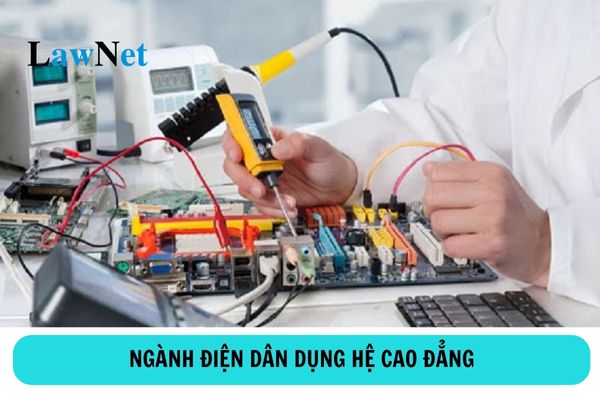What can graduates of the civil electrical program at the college level do after graduation in Vietnam?
What can graduates of the civil electrical program at the college level do after graduation in Vietnam?
Based on subsection 5, Section A, Part 5 of the Regulations on the minimum knowledge volume and competency requirements for learners after graduating from intermediate level, college level in business, management, and law fields (hereinafter referred to as the Regulations) issued together with Circular 41/2018/TT-BLDTBXH, students studying college major in civil electrical program can do the following jobs:
- Maintenance and repair of transformers, electric motors, and generators for private or joint venture enterprises;
- Installation, operation, maintenance, and repair of civil and household electrical equipment;
- Installation, maintenance, and repair of control and warning devices for civil use;
- Installation, maintenance, and repair of smart home electrical systems;
- Designing, supervising, and constructing lighting electrical networks, civil electrical networks, industrial electrical networks, and automation;
- Consulting on electrical, electronic, and automation products;
- Organizing business activities, training, and research in the field of civil electrical equipment.

What can graduates of the civil electrical program at the college level do after graduation in Vietnam? (Image from the Internet)
What skills must civil electrical engineering college graduates in Vietnam have after graduating?
Based on subsection 3, Section A, Part 5 of the Regulations issued together with Circular 41/2018/TT-BLDTBXH, civil electrical engineering college students must have the following skills:
- Proficient use of various types of electrical and non-electrical measuring tools;
- First aid for victims of labor accidents and electric shocks;
- Installing, checking, and repairing civil electrical systems and household electrical devices such as: apartment electrical systems, irons, rice cookers, water heaters, microwaves, washing machines, water pumps, and single-phase generators;
- Installation, maintenance, and repair of household heating devices and household refrigeration devices;
- Installation, maintenance, and repair of automatic control devices for residential use;
- Designing civil lighting electrical networks;
- Installation, operation, and repair of solar energy systems;
- Installation, operation, and repair of smart homes;
- Constructing civil lighting projects;
- Efficient and energy-saving usage that ensures the 5S standards;
- Organizing tasks and ensuring occupational safety, industrial hygiene, and fire prevention;
- Proficient use of basic information technology as required; exploiting, processing, and applying information technology in specialized tasks of the industry;
- Basic use of foreign languages, achieving level 2/6 in the Vietnam's Foreign Language Competency Framework; apply foreign language skills in professional tasks of the industry.
What knowledge must civil electrical engineering college graduates in Vietnam have after graduating?
Based on subsection 2, Section A, Part 5 of the Regulations issued together with Circular 41/2018/TT-BLDTBXH, college graduates majoring in civil electrical engineering must have the following knowledge:
- Explain the properties, uses, symbols, and scope of use of metals and alloys; lead wires, cables, and electromagnets; insulation materials, semiconductors, and magnetic materials commonly used in civil electrical engineering;
- Explain the principle structure, features, uses, and methods for using and preserving measuring tools, low voltage devices controlled by hand; protection devices, indirect control devices in civil electrical field;
- Explain the basic concepts and diagrams of common electronic circuits used in household electrical devices;
- Explain the operational principles and characteristics of types of sensors, oscillating circuits, sequential logic circuits, memory circuits, and A/D - D/A conversion circuits;
- Explain the method of calculating cross-sectional areas of conductors, circuit breakers, and the load of a household;
- Explain the uses, structures, operational principles, installation methods, and maintenance and repair procedures of household heating devices, single-phase transformers, single-phase synchronous generators, three-phase and single-phase asynchronous motors;
- Explain the use of software for drawing electrical circuits with computer assistance, the method of designing civil electrical networks;
- Explain concepts regarding the organization of production and management of small and medium enterprises;
- Explain technical electrical safety measures and first aid methods for labor accident victims; methods of rescuing victims of electric shocks;
- Explain basic knowledge of politics, culture, society, law, national security and defense, and physical education as required.
How many credits are required to study civil electrical engineering at college in Vietnam?
Based on subsection 1, Section A, Part 5 of the Regulations issued together with Circular 41/2018/TT-BLDTBXH:
General Introduction to the Industry
Civil electrical engineering at the college level is an industry in which practitioners specialize in the installation, operation, maintenance of motors, generators, repair of civil electrical systems, household electrical devices, control and warning devices, solar energy systems, and smart home systems, meeting technical requirements and ensuring safety, and meeting the level 5 requirements in the Vietnam National Qualifications Framework.
Civil electrical engineering practitioners are usually technical officers, design officers at production facilities, agencies, business units in technology, or self-organizers and owners of production and repair facilities for household and civil electrical devices.
The tasks of the industry are mainly performed in workshops, factories, production and business companies with favorable working conditions, ensuring safety, hygiene, and economic efficiency; the work intensity is not high but under great pressure in terms of service time and diverse customer satisfaction requirements.
To practice, workers must have good health, good professional ethics, sufficient professional knowledge, and vocational skills to meet job positions.
In addition, they need to regularly study to improve their communication skills in foreign languages, information technology to expand social knowledge; practice caution, detail, clarity; build a sense of profession and passion.
Minimum Knowledge Volume: 2,500 hours (equivalent to 90 credits).
Thus, students majoring in civil electrical engineering at the college level must study a minimum of 2,500 hours (equivalent to 90 credits).

